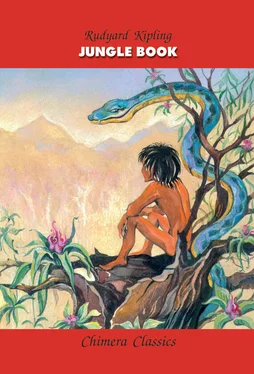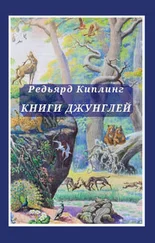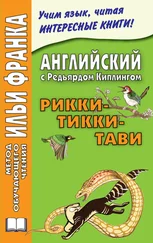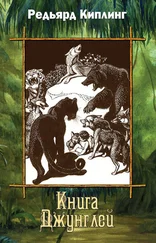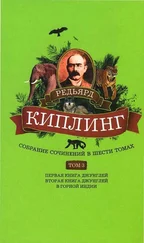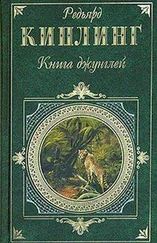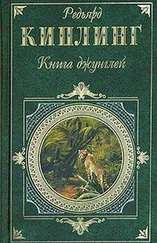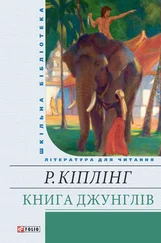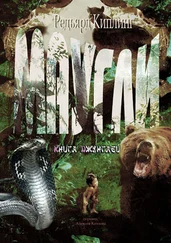Редьярд Киплинг - Jungle Book / Книга джунглей
Здесь есть возможность читать онлайн «Редьярд Киплинг - Jungle Book / Книга джунглей» — ознакомительный отрывок электронной книги совершенно бесплатно, а после прочтения отрывка купить полную версию. В некоторых случаях можно слушать аудио, скачать через торрент в формате fb2 и присутствует краткое содержание. Город: Санкт-Петербург, Год выпуска: 2003, ISBN: 2003, Издательство: Array Литагент «Антология», Жанр: foreign_prose, на английском языке. Описание произведения, (предисловие) а так же отзывы посетителей доступны на портале библиотеки ЛибКат.
- Название:Jungle Book / Книга джунглей
- Автор:
- Издательство:Array Литагент «Антология»
- Жанр:
- Год:2003
- Город:Санкт-Петербург
- ISBN:5-94962-016-X
- Рейтинг книги:3 / 5. Голосов: 1
-
Избранное:Добавить в избранное
- Отзывы:
-
Ваша оценка:
- 60
- 1
- 2
- 3
- 4
- 5
Jungle Book / Книга джунглей: краткое содержание, описание и аннотация
Предлагаем к чтению аннотацию, описание, краткое содержание или предисловие (зависит от того, что написал сам автор книги «Jungle Book / Книга джунглей»). Если вы не нашли необходимую информацию о книге — напишите в комментариях, мы постараемся отыскать её.
Jungle Book / Книга джунглей — читать онлайн ознакомительный отрывок
Ниже представлен текст книги, разбитый по страницам. Система сохранения места последней прочитанной страницы, позволяет с удобством читать онлайн бесплатно книгу «Jungle Book / Книга джунглей», без необходимости каждый раз заново искать на чём Вы остановились. Поставьте закладку, и сможете в любой момент перейти на страницу, на которой закончили чтение.
Интервал:
Закладка:
When Rikki got to the house, Teddy and Teddy’s mother (she looked very white still, for she had been fainting) and Teddy’s father came out and almost cried over him; and that night he ate all that was given him till he could eat no more, and went to bed on Teddy’s shoulder, where Teddy’s mother saw him when she came to look late at night.
«He saved our lives and Teddy’s life», she said to her husband. «Just think, he saved all our lives».
Rikki-tikki woke up with a jump, for the mongooses are light sleepers.
«Oh, it’s you», said he. «What are you bothering for? All the cobras are dead. And if they weren’t, I’m here».
Rikki-tikki had a right to be proud of himself. But he did not grow too proud, and he kept that garden as a mongoose should keep it, with tooth and jump and spring and bite, till never a cobra dared show its head inside the walls.
Darzee’s Chant
(Sung in honor of Rikki-tikki-tavi)
Doubled the joys that I know —
Proud of my lilt to the sky,
Proud of the house that I sew —
Over and under, so weave I my music – so weave I the house that I sew.
Sing to your fledglings again,
Mother, oh lift up your head!
Evil that plagued us is slain,
Death in the garden lies dead.
Terror that hid in the roses is impotent – flung on the dung-hill and dead!
Who has delivered us, who?
Tell me his nest and his name.
Rikki, the valiant, the true,
Tikki, with eyeballs of flame,
Rikk-tikki-tikki, the ivory-fanged, the hunter with eyeballs of flame!
Give him the Thanks of the Birds,
Bowing with tail feathers spread!
Praise him with nightingale words —
Nay, I will praise him instead.
Hear! I will sing you the praise of the bottle-tailed Rikki, with eyeballs of red!
(Here Rikki-tikki interrupted, and the rest of the song is lost.)
Toomai of the Elephants
I will remember what I was, I am sick of rope and chain —
I will remember my old strength and all my forest affairs.
I will not sell my back to man for a bundle of sugar-cane:
I will go out to my own kind, and the wood-folk in their lairs.
I will go out until the day, until the morning break —
Out to the wind’s untainted kiss, the water’s clean caress;
I will forget my ankle-ring and snap my picket stake.
I will revisit my lost loves, and playmates masterless!
Kala Nag, which means Black Snake, had served the Indian Government in every way that an elephant could serve it for forty-seven years, and as he was fully twenty years old when he was caught, that makes him nearly seventy – a ripe age for an elephant. He remembered pushing, with a big leather pad on his forehead, at a gun stuck in deep mud, and that was before the Afghan War of 1842, and he had not then come to his full strength.
His mother Radha Pyari, – Radha the darling, – who had been caught in the same drive with Kala Nag, told him, before his little milk tusks had dropped out, that elephants who were afraid always got hurt. Kala Nag knew that that advice was good, for the first time that he saw a shell burst he backed, screaming, into a stand of piled rifles, and the bayonets pricked him in all his softest places. So, before he was twenty-five, he gave up being afraid, and so he was the best-loved and the best-looked-after elephant in the service of the Government of India. He had carried tents, twelve hundred pounds’ weight of tents, on the march in Upper India. He had been hoisted into a ship at the end of a steam crane and taken for days across the water, and made to carry a mortar on his back in a strange and rocky country very far from India, and had seen the Emperor Theodore lying dead in Magdala, and had come back again in the steamer entitled, so the soldiers said, to the Abyssinian War medal. He had seen his fellow elephants die of cold and epilepsy and starvation and sunstroke up at a place called Ali Musjid, ten years later; and afterward he had been sent down thousands of miles south to haul and pile big balks of teak in the timberyards at Moulmein. There he had half killed an insubordinate young elephant who was shirking his fair share of work. After that he was taken off timber-hauling, and employed, with a few score other elephants who were trained to the business, in helping to catch wild elephants among the Garo hills.
Elephants are very strictly preserved by the Indian Government. There is one whole department which does nothing else but hunt them, and catch them, and break them in, and send them up and down the country as they are needed for work.
Kala Nag stood ten fair feet at the shoulders, and his tusks had been cut off short at five feet, and bound round the ends, to prevent them splitting, with bands of copper; but he could do more with those stumps than any untrained elephant could do with the real sharpened ones.
When, after weeks and weeks of cautious driving of scattered elephants across the hills, the forty or fifty wild monsters were driven into the last stockade, and the big drop gate, made of tree trunks lashed together, jarred down behind them, Kala Nag, at the word of command, would go into that flaring, trumpeting pandemonium (generally at night, when the flicker of the torches made it difficult to judge distances), and, picking out the biggest and wildest tusker of the mob, would hammer him and hustle him into quiet while the men on the backs of the other elephants roped and tied the smaller ones.
There was nothing in the way of fighting that Kala Nag, the old wise Black Snake, did not know, for he had stood up more than once in his time to the charge of the wounded tiger, and, curling up his soft trunk to be out of harm’s way, had knocked the springing brute sideways in mid-air with a quick sickle cut of his head, that he had invented all by himself; had knocked him over, and kneeled upon him with his huge knees till the life went out with a gasp and a howl, and there was only a fluffy striped thing on the ground for Kala Nag to pull by the tail.
«Yes», said Big Toomai, his driver, the son of Black Toomai who had taken him to Abyssinia, and grandson of Toomai of the Elephants who had seen him caught, «there is nothing that the Black Snake fears except me. He has seen three generations of us feed him and groom him, and he will live to see four».
«He is afraid of me also», said Little Toomai, standing up to his full height of four feet, with only one rag upon him.
He was ten years old, the eldest son of Big Toomai, and, according to custom, he would take his father’s place on Kala Nag’s neck when he grew up, and would handle the heavy iron ankus, the elephant goad, that had been worn smooth by his father, and his grandfather, and his great-grandfather.
He knew what he was talking of; for he had been born under Kala Nag’s shadow, had played with the end of his trunk before he could walk, had taken him down to water as soon as he could walk, and Kala Nag would no more have dreamed of disobeying his shrill little orders than he would have dreamed of killing him on that day when Big Toomai carried the little brown baby under Kala Nag’s tusks, and told him to salute his master that was to be.
«Yes», said Little Toomai, «he is afraid of me», and he took long strides up to Kala Nag, called him a fat old pig, and made him lift up his feet one after the other.
«Wah!» said Little Toomai, «thou art a big elephant», and he wagged his fluffy head, quoting his father. «The Government may pay for elephants, but they belong to us mahouts.
When thou art old, Kala Nag, there will come some rich rajah, and he will buy thee from the Government, on account of thy size and thy manners, and then thou wilt have nothing to do but to carry gold earrings in thy ears, and a gold howdah on thy back, and a red cloth covered with gold on thy sides, and walk at the head of the processions of the King.
Читать дальшеИнтервал:
Закладка:
Похожие книги на «Jungle Book / Книга джунглей»
Представляем Вашему вниманию похожие книги на «Jungle Book / Книга джунглей» списком для выбора. Мы отобрали схожую по названию и смыслу литературу в надежде предоставить читателям больше вариантов отыскать новые, интересные, ещё непрочитанные произведения.
Обсуждение, отзывы о книге «Jungle Book / Книга джунглей» и просто собственные мнения читателей. Оставьте ваши комментарии, напишите, что Вы думаете о произведении, его смысле или главных героях. Укажите что конкретно понравилось, а что нет, и почему Вы так считаете.
